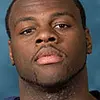
Chris Allen Does Not Want You to Read This
7/20/2009 12:00:00 AM | Football
By Richard Retyi, Athletic Media Relations (special thanks to Lindsey Bennett)
Celebrated journalist A.J. Liebling once wrote, "There is almost no circumstance under which an American doesn't like to be interviewed."
Chris Allen is one of the exceptions, maybe because he's Jamaican.
Chris Allen is the toughest interview of my career. An interview I did with Zoltan Mesko was a piece of cake. Lloyd Carr was a snap. Henry Winkler spoke to me for a half-hour when I was writing for my college newspaper. Even Rich Rodriguez gave me 10 minutes at breakfast one morning during his first fall camp, graciously answering questions even while I crouched awkwardly next to him and his bowl of cereal with my pad and pen.
Not to say that Mike Barwis' right-hand man is impassive or rude. He is a busy man and he REALLY doesn't like talking about himself. Some people are hesitant to tell their story, but once they get going it's not so bad. Allen is different. During our first meeting, standing near an endless rack of dumbbells in the weight room at Schembechler Hall, I approached him to schedule an interview for MGoBlue.com. He politely declined multiple times, and even pitched me ideas on worthier features, in his estimation. I had to patiently chip away at him like Andy Dufresne on the walls of Shawshank before I saw light. I felt like Richard Milhous Nixon courting his future wife, Pat, wearing her down for two years to the point of even driving her on dates with other suitors before she finally came around and married him. With Chris Allen it took two meetings, 25 minutes of persistence and some schedule shuffling, but I finally got the interview with Michigan football's associate director of strength and conditioning and the man who Mike Barwis calls his twin brother.
Allen was born in Kingston, Jamaica, and bounced back and forth between the United States and his birth country since he was eight years old. His family first moved to the Bronx when he was eight, seeking greener pastures, but homesickness brought them back to Kingston four years later. Part of the family returned to the Bronx midway through Allen's high school years and he's lived full time in the U.S. ever since.
As an athlete, Allen was an accomplished sprinter bred from a culture of great sprinters. Following a stellar prep career, he received an academic and athletic scholarship to compete at West Virginia University, where he pursued a degree in accounting and management information systems for business.
After graduation, Allen's future was hazy. He flirted with the idea of pursuing a career as a certified public accountant, but his heart wasn't in it. Out of necessity, he moved to Atlanta where his sister had lived and worked since his freshman year of college. Over time, Allen's younger brothers also moved from Jamaica to Atlanta, making it a second home for him. Once in Atlanta, Allen secured a job with a web site hosting company, but his heart wasn't in this line of work either. He began volunteering with his brother's high school football team, lending some of his training experience to the squad to help them with conditioning, speed, agility, you name it. His intention was just to help his little brother's team, but the venture turned into something more as Allen tired of his nine-to-five.
During his sprinting days, Allen worked with a fiery young strength and conditioning coach at West Virginia named Mike Barwis. Barwis was an assistant when Allen started his career as a collegiate sprinter and had risen to Director of Olympic Sports by 2003. Now, helping his brother's team train for the season, Allen liked this new volunteer gig so much that he called Barwis to inquire about employment opportunities at his alma mater. Barwis swiftly signed him on as a graduate assistant, allowing Allen to return to school to pursue a master's degree in athletic coaching education.
Allen loved his new life, looking forward to going to work each day. Helping his charges become better athletes and better people gave him a satisfaction that IT work never could. He worked hard and worked his athletes harder and they flourished under his guidance. Barwis was immediately impressed by Allen's work on the other side of the coach and athlete fence, praising his even-keeled disposition and ability to motivate athletes and get them to achieve things they never thought possible. One year later, Allen was hired as a full-time assistant on Barwis' staff and their relationship grew stronger as the pair helped build West Virginia's strength and conditioning program to greater heights.
The move to Ann Arbor didn't faze Allen, who had no doubts about following his mentor to Michigan. He viewed it simply as a change of scenery with many of the same parts in place. Kids were kids, football was football and the challenge of starting over with the Wolverines was one he was willing to embrace.
Barwis, Allen and the rest of the strength and conditioning staff set up shop in Ann Arbor and began to implement their program. One of the side benefits of having a world-class strength and conditioning program is the ability to draw alumni now playing professional football and hockey back to Schembechler Hall. With former Wolverines like Larry Foote, LaMarr Woodley, Mike Hart and Steve Breaston spending time in the weight room, it sets a tone of excellence that current Wolverines can follow. The strong character and leadership abilities of these former Wolverines can't help but rub off on the current crop as well.
Allen doesn't treat these professionals with their Super Bowl rings and multi-million dollar contracts any differently than he treats a freshman defensive lineman in the School of Kinesiology. He targets each individual specifically and his challenge is to learn what motivates each personality, regardless of age, background, position or checking account balance. What might work for an athlete like Greg Banks might not work for Renaldo Sagesse. Ditto Mike Hart and Jamar Adams. It's this challenge, as well as helping his players achieve and succeed, that motivates Allen. He works for them and for the program, not for personal notoriety or much sought after MGoBlue.com coverage.
Despite a recent trip to visit family in Kingston, Allen hasn't had many opportunities to return to Jamaica. Part of him hopes he doesn't have too many more opportunities in the future. In December, Allen flew to Jamaica for the first time in years because of the absence of a bowl game. It was a bittersweet trip and one he hopes he can take any other month but December and January. He has a sister, brother, nieces and nephews still in Georgia but to date, no one has made the trip to Ann Arbor. Perhaps it's because of Allen's busy schedule or maybe they have as much trouble as I did getting him to sit down and talk. Either way, I have no doubt that his family knows that a conversation with him is worth the persistence. If they come to town they can even stay with me. But I'm not driving anyone on any dates.









